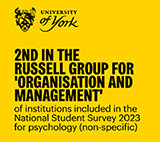
Clinical Psychology
Gaining relevant work experience can be crucial for success in obtaining an Assistant Psychologist or Research Assistant post, the traditional routes for entry to clinical psychology training.
Try to gain a variety of experiences – think about the work that clinical psychologists are involved in, the types of problems they treat and the settings in which they work.
Your aim should be to gain experience which will help you to develop your communication and care skills with different client groups and gain exposure to different mental health problems. This should also help you to develop an understanding of the role of clinical psychologists and other professionals who work in mental health settings and help you decide if clinical psychology is really for you.
The information below will give you an overview of what kind of work experience is relevant, and the Careers job sector pages will also help you identify opportunities:
Clinical settings
It’s important to try to gain some experience in a clinical environment, which could be in an NHS or private setting, hospital, residential or community based. You can find contact details for Trusts and Services which you could use to request work or volunteering experience.
Care work
Care work or support work is valuable experience and can be gained through working in residential care homes and day centres. Local authority Social Services departments will usually run some residential facilities and day centres for people with mental health problems and/or learning disabilities so they are a good place to start.
Some centres are run by private and not-for-profit organisations - local and national. Try approaching care homes and centres directly for work experience or check for vacancies.
United Response is an agency that supports people with learning disabilities. Some students have worked with them in the past but you will probably need some care related experience first.
Working as a Classroom/Learning Support Assistant in special schools or with pupils with special educational needs can also be useful work experience.
Other Opportunities
- Improve your counselling/listening skills by volunteering on the helplines of organisations such as the Samaritans or the University’s NightLine service
- Volunteer with a national mental health charity such as Mind or seek out other local volunteering opportunities eg St Leonard’s hospice, Age Concern.
- YUSU has a number of ongoing volunteering projects, including Minds in Motion (supporting people with dementia and their carers).
Don’t underestimate the importance of being able to drive – it is a requirement for many Assistant Psychologist posts as they can involve travel to sites not always well served by public transport.
Academic Research
Working as a Research Assistant can also be useful work experience. Staff in your department recruit students to assist with their research during vacations – look out for information - but you could also volunteer to help out. You should also consider whether your final year literature review and/or project can be tailored to your interests, perhaps by carrying out your research in conjunction with an outside organisation.
After Graduation
Assistant Psychologist vacancies and other related posts are advertised in the following:
- BPS website
- The NHS Jobs website
- The Guardian - sometimes carries relevant vacancies
- Times Higher Education Supplement and www.jobs.ac.uk for research posts
- Local newspaper websites – occasionally carry Assistant Psychologist vacancies but will also advertise Care Assistant and Support Work vacancies
- Applications to clinical psychology training are made at www.leeds.ac.uk/chpccp
For further information and advice see the following:
- How to Become a Clinical Psychologist, Alice Knight (book located in Health & Social Care section of Careers information room)
- www.psyclick.org.uk
